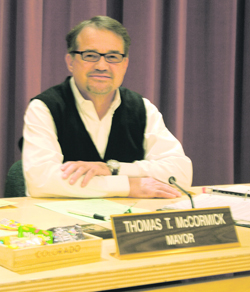
| ||||||
McCormick, now in his fourth year on the Orinda City Council, stepped up to the post of Mayor in December taking over for Sue Severson. "I thought it was time for the Council to change to reflect the changing demographics of the City," cites McCormick as his motivation to run for the Council. "A number of families were moving into the area, and the zoning ordinances were prohibitive to their remodeling," he says, adding that he saw the need to upgrade Orinda's downtown area as vital as well.
McCormick has made the streamlining of the development process and the promotion of growth and change in the commercial districts in Orinda among his priorities. For the past two years, he served as the Council liaison to the Planning Process Review Task Force, which outlined over sixty recommendations to facilitate development. The recommendations are now under review by the Planning Commission and Council with the aim to incorporate these into ordinances and the General Plan.
"The people of Orinda have a small town sensibility with a big city sophistication," says McCormick-one of the reasons he has been drawn to the community. A small-town boy himself, McCormick grew up in the farming community of Visalia outside of Fresno. He then headed north to the Bay Area where he received his undergraduate degree from the University of California, Berkeley, and a law degree from the University of San Francisco Law School.
The product of what McCormick describes as very liberal parents, he says the importance of giving people a helping hand and volunteering in one's community was instilled in him from an early age. Out of law school, McCormick became involved with VIP Mentors-a program that recruits attorneys to be advisors and role models for young parolees from the Division of Juvenile Justice system. He also helped to establish the Alameda Food Bank and served as one of the first Board members. Upon arriving in Orinda, he translated his volunteer commitments to the community, serving on the Boards of the Orinda Association and Orinda Baseball Association and working for the public schools.
As Orinda approaches the 25th anniversary of its incorporation this summer, McCormick thinks the City needs to prepare for the future. With a large portion of Orinda residents retired or with no kids in the home, he believes there is a need for alternative housing options to enable residents to downsize but stay local. He advocates for growth downtown that includes residential units, such as townhomes and condominiums, is transportation-friendly, and feels like a vibrant community center.
On the subject of the City's budget, which required over $500,000 in cuts and staff furloughs to balance, McCormick states, "Things look bleak." He notes that the City will probably have to continue with a very conservative budget approach in order to be prepared for things that might further negatively impact City finances in the future.
Regarding the City's crumbling roads, McCormick is frank, "The need is extreme."
He sees improving the business base, so that businesses thrive and sales tax increases, as among the best solutions to funding the infrastructure needs. But he acknowledges, "This is a long-term goal and won't fill any potholes today." With bond measures twice rejected, he knows funding is a challenge. McCormick is interested in the idea of Orinda becoming a Charter City, which would allow the City to pursue a real estate transfer tax.
"The Charter City status would enable the City to behave more like surrounding cities providing us with greater control of our destiny," he says.
With the cost of police services consuming 40% of the City budget and potentially rising to as much as 70% of the budget over the next several years, McCormick believes the rapidly escalating benefit costs associated with the contract with the Contra Costa County Sheriff's Office (CCCSO), whom the City contracts for police services, must be addressed. As a comparison, he notes that the benefit load for the City's employees represents 35% of employee costs, whereas the CCCSO benefits are more than 100% of the total salary costs of the police department.
"I think it is great that the citizens are interested and involved on both sides of this issue," states McCormick, regarding the public discussion that has surfaced over the equity of the City's tax contribution to the Moraga Orinda Fire District (MOFD) and the cost-efficiency of the MOFD. "It's the job of our Council to provide the best service at the best cost," says McCormick, while he acknowledges, "We don't have control over the MOFD. It is incumbent on the Council that Orinda's tax dollars are spent wisely." He adds that the Local Area Formation Commission (LAFCO) has directed the groups [MOFD, Orinda, and Moraga] to meet, and he believes all the options should be on the table.
With a busy year ahead, McCormick is fortunate that his children take responsibility for feeding and caring for the various family pets. This still leaves McCormick with a full plate of issues to manage, which he seems to take in stride. "I'm looking forward to an exciting year," say McCormick. "We are faced with several challenges but with that comes great opportunities."
Reach the reporter at:
Copyright
